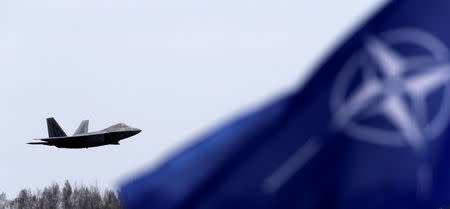Russia warns of retaliation if NATO makes more deployments in Eastern Europe
By Dmitry Solovyov and Lidia Kelly MOSCOW (Reuters) - Russia will take retaliatory measures if NATO deploys four extra battalions in Poland and the Baltic states and it will reinforce its western and southern flanks with three new divisions by the year-end anyway, officials said. U.S. Defense Secretary Ashton Carter said on Monday that NATO was weighing up rotating four battalions of troops through eastern member states amid rising tension in the Baltic. Russia has scrambled jets to intercept U.S. reconnaissance planes in recent weeks and made simulated attack passes near a U.S. warship in the Baltic Sea. Andrei Kelin, a department head at Russia's Foreign Ministry, said on Wednesday that the proposed NATO deployment spoken of by Carter was a source of concern for Moscow. "This would be a very dangerous build-up of armed forces pretty close to our borders," Kelin told the Interfax news agency. "I am afraid this would require certain retaliatory measures, which the Russian Defence Ministry is already talking about." Russia announced in January it would create three new military divisions and bring five new strategic nuclear missile regiments into service. On Wednesday, Russian Defence Minister Sergei Shoigu said the new divisions would be formed by the end of this year and were being created to counter what Moscow saw as NATO's growing strength. Russian media, citing unnamed military sources, said the new divisions would most likely be motorised rifle ones and number around 10,000 soldiers each. "The Ministry of Defence has adopted a series of measures to counter the growing capacity of NATO forces in close proximity to the Russian borders," Shoigu said in televised comments. The new divisions are likely to be deployed in military districts close to Russia's borders with Ukraine, Belarus, the Baltic states and Finland as well as Georgia and Azerbaijan. Russia has reacted angrily to NATO's increased military presence in countries that were once part of the Soviet Union and to military exercises close to its borders. But its own actions, particularly its annexation of Ukraine's Crimea in 2014, have sparked anxiety in the region and Estonia, Latvia and Lithuania asked the alliance to expand its presence on their soil as a deterrent. The Kremlin strongly denies having any intention to attack the Baltic countries, but has often said it feels they have become an aggressive "russophobic kernel" pushing NATO towards a consistently anti-Russian course. (Additional reporting by Jack Stubbs; Writing by Andrew Osborn; Editing by Richard Balmforth)

 Yahoo News
Yahoo News 

